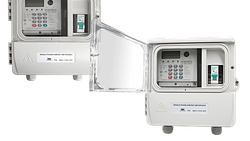The power grid in Germany is safe and stable, even amidst the energy crisis, and a complete blackout is highly unlikely. However, the Federal Office for Civil Protection and Disaster Assistance recommends that all citizens have an emergency preparedness checklist.
This topic is stressed in the news since several months, so regarding the power grid I have my doubts.
Nevertheless, power outages can occur unexpectedly and disrupt our daily lives. Whether caused by severe weather, equipment failure, or other unforeseen circumstances, being prepared for a power outage is crucial. This guide will outline some practical steps you can take to ensure you and your household are well-prepared when faced with a power outage.
Create an Emergency Kit
Preparing an emergency kit is an essential first step. This kit should include:
- Flashlights and extra batteries
- Candles and matches
- Portable phone charger or power bank
- Battery-powered or hand-crank radio
- Basic first aid supplies
- Bottled water (at least 20 litres per person, considering a 10 days blackout)
- Non-perishable food items
- Manual can opener
- Blankets and warm clothing
- Essential medications
- Cash (in case ATMs are inaccessible)

Develop a Communication Plan
During a power outage, communication can be challenging. Establishing a communication plan in advance will help ensure that you can stay connected with family members and loved ones. Consider the following:
- Designate an out-of-area contact person who can serve as a central point of communication.
- Share contact information with all household members.
- Teach everyone how to send and receive text messages, as they can often be more reliable than phone calls during an outage.
- Determine backup communication methods, such as two-way radios or walkie-talkies.
Protect Your Electronics
Power outages can potentially damage electronic devices. To safeguard your electronics:
- Use surge protectors to protect sensitive equipment.
- Unplug major appliances and electronics to avoid damage from power surges when the power is restored.
- Consider investing in an uninterruptible power supply (UPS) to provide temporary power to important devices like computers.
Prepare Your Home
Taking a few precautionary measures within your home can make a power outage more manageable:
- Install battery-powered smoke and carbon monoxide detectors.
- Keep a fire extinguisher readily accessible.
- Have a backup heating source (e.g., a generator, wood stove, or propane heater) for cold weather.
- Insulate windows and doors to retain heat during colder months.
- Identify and label the location of your electrical panel, water shut-off valve, and gas shut-off valve.
Stock Up on Essential Supplies
Ensuring you have an ample supply of essential items is crucial during a power outage:
- Stock up on non-perishable food items that do not require refrigeration or cooking.
- Have a manual can opener available.
- Store an adequate supply of prescription medications, as well as over-the-counter remedies for common ailments.
- Keep a sufficient amount of baby supplies, if applicable (e.g., formula, diapers).
- Store extra blankets, warm clothing, and sturdy shoes for each household member.
Learn Basic Survival Skills
Having some basic survival skills can prove invaluable during a power outage:
- Familiarize yourself with alternative cooking methods, such as using a gas camping stove or a gas grill.
- Learn how to start a fire safely (not indoors)
- Understand basic first aid techniques.
- Acquire knowledge of how to purify water if your supply becomes compromised.
Stay Informed
Being informed about the power outage and its estimated duration can help you plan and stay safe:
- Listen to battery-powered or hand-crank radios for updates from local authorities.
- Follow official social media accounts and websites of utility companies for outage information.
- Sign up for text alerts provided by your local utility company.
- Stay tuned to weather forecasts to anticipate potential power outages caused by severe weather conditions.
Takeaway
Power outages are unpredictable, but by taking the time to prepare, you can minimize the impact on your daily life and ensure the safety and well-being of your household. By following the comprehensive steps outlined in this guide, you will be better equipped to handle a power outage efficiently.
Remember to create an emergency kit with essential supplies, develop a communication plan, protect your electronics, prepare your home, and stock up on necessary items. Additionally, acquiring basic survival skills and staying informed through various channels will enhance your ability to navigate through a power outage successfully.
Stay proactive and regularly review your emergency preparedness measures to ensure they are up-to-date. By being prepared, you can face power outages with confidence and keep your household safe and secure until power is restored.
Lastly, always prioritize safety during a power outage. If you encounter any hazardous situations or require immediate assistance, do not hesitate to contact local authorities or emergency services. Stay vigilant, stay prepared, and stay safe.
Personal note: My household's coverage is about 50 % of the mentioned items, but this should not discourage you to be better prepared. You can leave me a comment regarding your preparation status below, before or after the outage.
Editor's note: This article was originally published in June 2023 and has been updated for comprehensiveness.





All comments are moderated before being published. Inappropriate or off-topic comments may not be approved.